CARACAS, (Reuters) – Legislators passed a law late on Thursday that could reduce religious education in Venezuela, where critics of President Hugo Chavez say he wants to strengthen his grip over schools and universities.
The government says the new law, which has not yet been published, will improve education at all levels in the predominantly Catholic country. The proposal being debated contained few controversial articles, but eliminated explicit provision for religious education.
“This law is needed for many reasons … the curriculum, the functioning of schools, the incorporation of the community,” said Education Minister Hector Navarro.
Chavez is committed to strengthening the state in most areas of life in South America’s top oil exporters. He is rushing through over a dozen laws to regulate the economy, the workplace and trade, taking advantage of a weak opposition.
Opposition to the education reform was led by the Roman Catholic church and university authorities. The church says the law will lead to reduced religious teaching in schools and removes the state’s obligation to subsidize private, church-run schools in poor neighborhoods.
University and private school authorities fear the law will allow increased government influence on campuses by involving grass-roots community groups, often loyal to Chavez, in their operations.
Universities are often at the center of protests against the Chavez government.
In the early hours of yesterday morning, after several opposition lawmakers abandoned the debate, pro-Chavez legislators also passed a law making it easier for the government to expropriate land in urban areas to tackle the OPEC nation’s housing shortage.
As the education law was being discussed on Thursday, a small group protested near the national assembly but they were dispersed by police with tear gas. A larger group of government supporters marched in support of the law.









